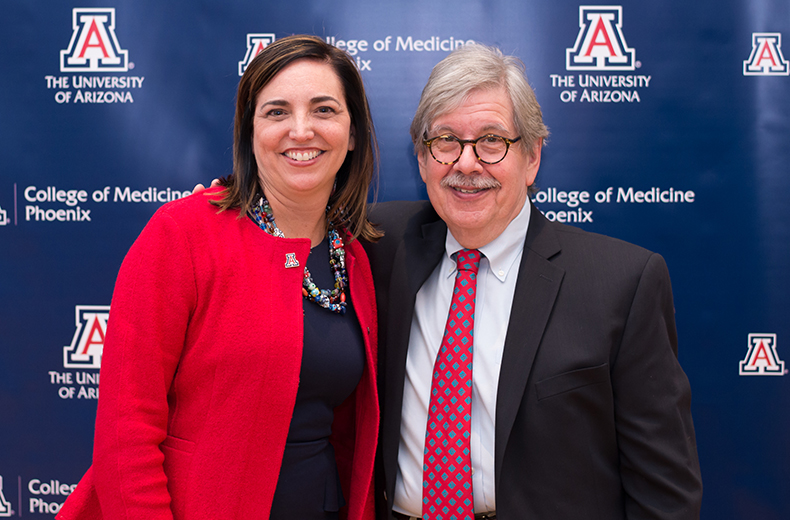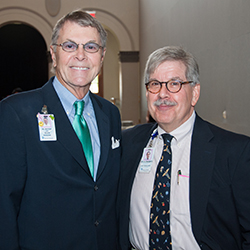
Alan Leibowitz, MD, Dedicates Career to Improving Medical Education in Phoenix

After 30 years of teaching the next generation of physicians and helping create an academic medical center in Phoenix, Alan Leibowitz, MD, is retiring from the University of Arizona College of Medicine – Phoenix and Banner – University Medical Center Phoenix.
Dr. Leibowitz came to Phoenix in 1989 as the associate department head for Internal Medicine for Banner – University Medical Center Phoenix, formerly known as Banner Good Samaritan Medical Center. Beginning in 2007, he served as the head of graduate medical education and was the designated institutional officer at Banner Health, overseeing graduate medical education programs.
In 2015, when the Banner Health and University of Arizona Health Sciences partnership was finalized, he was named associate dean for Graduate Medical Education at the College of Medicine – Phoenix.
Dr. Leibowitz always wanted to work in academics, but when he started his career in medicine, he never imagined he’d spend 30 years improving graduate medical education in the Phoenix area.
“I always saw myself as a problem solver, teacher and innovator,” Dr. Leibowitz said. “It was fun to share the knowledge and experiences I obtained over the years with others.”
Dr. Leibowitz graduated from Brooklyn College with an undergraduate degree in biology. He started medical school at the age of 20 at University at Buffalo School of Medicine and Biomedical Sciences and completed an internship in internal medicine in his hometown of Brooklyn, New York. After spending two years in the Southwest, he completed a residency and gastroenterology fellowship at Dartmouth-Hitchcock Medical Center. This was followed by a research fellowship in hepatology and gastroenterology at the Buffalo General Hospital.
After his internship in internal medicine, Dr. Leibowitz came out west and joined the Indian Health Service, where he spent two years in Gallup, New Mexico, which is on the border of the Navajo Reservation. At the time, the town had a population of 8,000. He worked at the hospital seeing patients, conducting research, teaching and delivering babies.
“It was an amazing experience,” Dr. Leibowitz said. “It was a culture shock coming from Brooklyn to this small town. It’s an experience that helped me grow as a physician and was the beginning of my teaching career; and I learned that there was a part of the country that I never knew existed.”

“I visited the hospital and Phoenix several times to be sure that I wanted to make the move and to look under all the rocks … and I still liked it,” Dr. Leibowitz said. “At that point, there were only three full-time faculty members in internal medicine at ’Good Sam’ and the hospital was a place for medical students from Tucson to come home and do their clinical rotation. The College of Medicine – Phoenix was a dream. Phoenix was a place where we could grow things, and we did.”
Dr. Leibowitz said he is amazed at how the medical school has grown over the years from a gravel lot to a class of 24 to, now, 500 medical school graduates and 340 residents and fellows.
“I knew that building a medical school in Phoenix was doable, and I knew we had the potential,” he said.
Dr. Leibowitz said his greatest accomplishment is building up the Internal Medicine program at Banner – University Medical Center Phoenix and all of the graduate medical education at Banner and the College of Medicine – Phoenix.
“I remember how excited we all were when we had 20 faculty members in Internal Medicine,” he said. “My greatest accomplishments have been building up those programs as head of medical education and helping build the medical school in Phoenix.”
Under his leadership, the graduate medical education programs expanded from 230 residents and fellows to 26 programs and more than 330 participants. He was a key leader in the original expansion of clinical training for UA College of Medicine students to Phoenix in 1992. His influence continued as a founding leader in the establishment of the UA College of Medicine – Phoenix, playing a critical role developing and strengthening the college’s relationship with Banner – University Medical Center Phoenix.
Dr. Leibowitz has been named Emeritus Professor by University of Arizona President Robert C. Robbins, MD. He will continue to serve on college committees as a member of the faculty and as a senior strategy adviser. On July 1, 2019, Cheryl O’Malley, MD, assumed the role of associate dean of Graduate Medical Education.
“In so many ways, Alan is responsible for where I am,” Dr. O’Malley said. “He has invited me into many career opportunities, mentored me as my skills grew and created a kind community focused on supporting each other and our mission. I am proud to be entrusted to continue in his footsteps. Alan is humble and never one to seek credit or recognition, truly a ‘silent protector.’ We all are better because of his life’s work, which has been our programs and individual careers.”
The campus gathered on Oct. 14 to celebrate Dr. Leibowitz’s accomplishments and contributions to the medical school.
About the College
Founded in 2007, the University of Arizona College of Medicine – Phoenix inspires and trains exemplary physicians, scientists and leaders to advance its core missions in education, research, clinical care and service to communities across Arizona. The college’s strength lies in our collaborations and partnerships with clinical affiliates, community organizations and industry sponsors. With our primary affiliate, Banner Health, we are recognized as the premier academic medical center in Phoenix. As an anchor institution of the Phoenix Bioscience Core, the college is home to signature research programs in neurosciences, cardiopulmonary diseases, immunology, informatics and metabolism. These focus areas uniquely position us to drive biomedical research and bolster economic development in the region.
As an urban institution with strong roots in rural and tribal health, the college has graduated more than 1,000 physicians and matriculates 130 students each year. Greater than 60% of matriculating students are from Arizona and many continue training at our GME sponsored residency programs, ultimately pursuing local academic and community-based opportunities. While our traditional four-year program continues to thrive, we will launch our recently approved accelerated three-year medical student curriculum with exclusive focus on primary care. This program is designed to further enhance workforce retention needs across Arizona.
The college has embarked on our strategic plan for 2025 to 2030. Learn more.